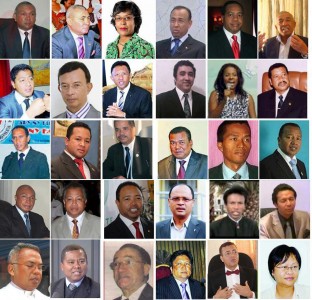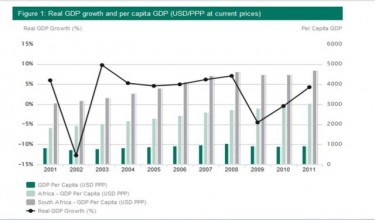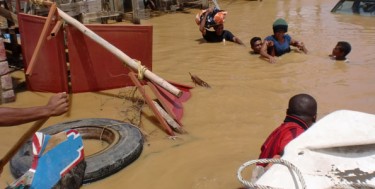Political stalemate, financing issues, and logistical hurdles threaten to derail Madagascar's overdue upcoming presidential elections [1], the country's first since a coup in 2009 plunged the island into political crisis [2].
Voting was originally scheduled for 24 July, 2013, but faced with sorting out the legitimacy of some contested candidates, the government has postponed elections again [3], moving the date a month later to 23 August, 2013.
Madagascar has not had an elected president since the spring of 2009, when elected President Marc Ravalomanana was forced to resign his power by the country's military following violent clashes between authorities and anti-government protesters. The military promptly handed over the government reigns to opposition leader Andry Rajoelina [4], who immediately dissolved the two houses of parliament.
During Rajoelina's tenure as head of the transitional government, presidential elections have been pushed back three times since the first scheduled date, 26 November, 2010, and parliamentary elections have been postponed four times since 20 March, 2010. Because of this political cluster, the European Union, the United States, and other countries suspended [5] aid to the island and the African Union suspended Madagascar's membership until a return to the state of law.
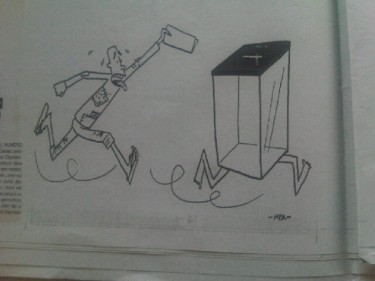 [6]
[6]Cartoon about the ever-eluding elections in Midi Madagasikara paper edition posted by @Aline_Tana on Twitter (posted with her permission)
More than two years after the ouster, Rajoelina and three of the country's four main opposition parties signed [7] a political road map [8] [fr] on 16 September, 2011 that says former presidents and the current president of the transition are prohibited from running for another presidential term. The road map [9] also states [8] [fr] that any candidates running need to resign from any governing office if they want to validate their candidacy.
That hasn't stopped three candidates of the 50 candidates [10] running from throwing their hat into the ring, despite violating parts of the road map and international pressure to withdraw: the current President of the transition, Rajoelina; Madagascar's former two-time President Didier Rastiraka, who served from 1975 to 1993 and from 1997 to 2002; and Lalao Ravalomanana, the wife of booted President Ravalomanana. Rajoelina initially stated that he would not seek a presidential term [11], but has since changed his mind [12].
Given the political deadlock caused by the three aforementioned candidacies, all three and their spouses are now barred from entering the European Union [13] with a Schengen Visa [fr].
As for the rest of candidates who have been preparing for elections since 2011, here is a photo montage of some of them:
The country's leadership crisis has had far-reaching consequences well beyond the political arena. A report by the World Bank states that the impact of the political crisis [15] is multi-pronged:
- The economy has stalled, income per capita has fallen
- Poverty has sharply increased
- Social outcomes have worsened
- Public finances are increasingly under stress
- Foreign aid remains muted
- Infrastructure has deteriorated
- The ability to deal with exogenous shocks is severely curtailed
- The resilience of agriculture had helped avoid a food crisis so far
- Madagascar’s longstanding governance problems have only been exacerbated
- The resilience of the private sector is increasingly being tested
More than 92 percent of the population live under two US dollars a day. Because of the sharp decline in job opportunities [17] since the crisis, poverty has driven women into prostitution [18] with 29,000 registered sex workers in the town of Toamasina in 2012, up from 17,000 in 1993. A documentary by Journeyman Pictures details the lives of those who are forced to trade sex [19]for survival:
Complicating the already tense situation, the country was recently hit by cyclone Haruna which ravaged most of its southern region [20]. A locust infestation followed, wrecking havoc on its already fragilized agriculture [21].
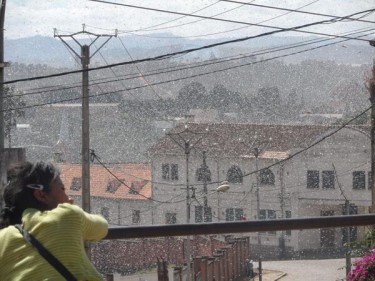
Locust invasion in down town Fianaratsoa, Madagascar via @lrakoto on Twitter (with the author's permission)
Transparent, credible, and timely elections are seen by many as the first critical step towards exiting the crisis, but it appears that the vote may still very well be in jeopardy. How much longer can the Malagasy people endure such hardships?
